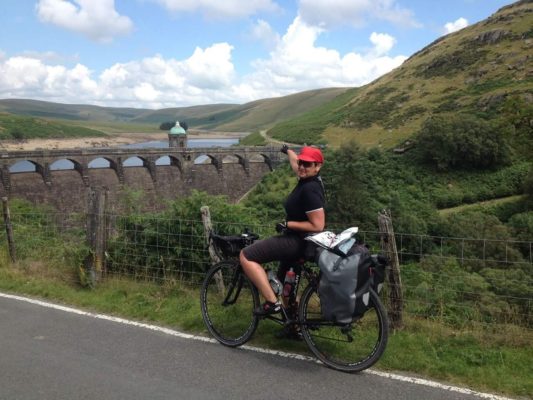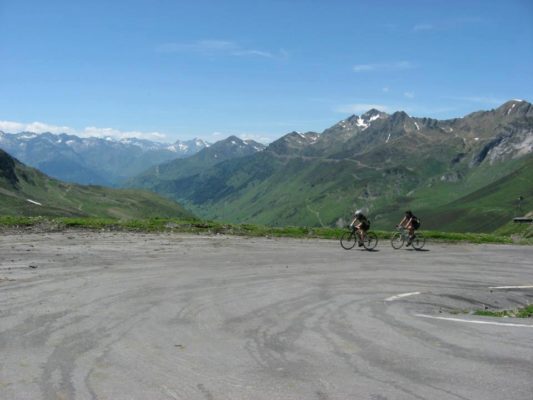Hi. Sarah Strong here. Some of you reading this may have made it to BBP on Thursday 13th September to the #bikesandbrains talk. If you did, I hope you enjoyed it and found it a useful evening too.
The Bikes and Brains blog, and the evenings that I arrange with cycling venues are spaces where we can talk/share/listen/read* (*delete as appropriate) about cycling and mental health – or riding and wellbeing in general.

Over the past fifteen years or so that I’ve been involved with cycling I’ve detected, what seems to me, a large overlap of ‘people who cycle’ and people who experience mental health issues’ – this got me thinking about how cycling might be particularly beneficial to health but also, sometimes, how our riding can be affected by low mood, anxiety, and so on.
Cycling is awesome, bikes are awesome, but cycling isn’t the one thing that will cure you, even if it feels sometimes as if it does. There is no casual link between cycling and better mental health – there are so many different factors interacting; physical exercise, social interaction or solitude, headspace, to learning new skills.
I have a bit of a pet hate for overly motivational posters, even though I understand the sentiment. I found that as my relationship with cycling developed and changed I was more conscious of how my personal challenges with anxiety impacted my riding. Generally-speaking I think this can depend on the type of cycling you do, and what you gain from it. I suspect that difficulties arise as you push yourself further. I found anxiety affected my racing and had to do a bit of soul-searching to identify what I wanted from the bike.
 Eleanor Jaskowska is an audaxer and ultra-distance rider. She spoke very eloquently during the evening on some of the issues she found herself coming up against during the TransContinental Race in 2017. I’d hazard that for a significant number of participants the challenge is equally mental as well as physical. How do you keep going when you’re exhausted? How do you figure out how to push through and keep going? Can you convince yourself that you can do it, regardless of the difficulties you face? Also, about learning as you go along – when and how much to eat, how to pace yourself. Most importantly perhaps, how do you process pulling out of a race? How can you reframe goals and achievements, and avoid looking on an uncompleted event as a ‘failure’.
Eleanor Jaskowska is an audaxer and ultra-distance rider. She spoke very eloquently during the evening on some of the issues she found herself coming up against during the TransContinental Race in 2017. I’d hazard that for a significant number of participants the challenge is equally mental as well as physical. How do you keep going when you’re exhausted? How do you figure out how to push through and keep going? Can you convince yourself that you can do it, regardless of the difficulties you face? Also, about learning as you go along – when and how much to eat, how to pace yourself. Most importantly perhaps, how do you process pulling out of a race? How can you reframe goals and achievements, and avoid looking on an uncompleted event as a ‘failure’.
Ian Walker is a researcher in environmental psychology at the University of Bath and outside of his work he is an ultra-distance racer, having undertaken the TransContinental and recently won the North Cape 4000 across Europe. He spoke of bringing some of the advice he was given during running races into his cycling – about just putting one foot in front of the other, of breaking the challenge up into more manageable sections, also of the apparent absurdity of it all – the What-Am-I-Doing-ness of it all.
Underlying both contributions was the sense of having to keep moving forward. How stopping can mean thinking, and thinking can impact your focus. Your head can get in the way. Sometimes it’s easier just to do and feel rather than to think (which can lead to over-thinking, which can lead to anxiety, which can affect decision-making).
These factors are not just apparent in extreme events, however, and can be evident in an action as supposedly straightforward as walking out of the front door to bike to the shops. In fact, getting through the front door can be one of the hardest first steps! Issues such as anxiety and low mood can be very isolating in various ways. Things can seem conspire against you; if you are experiencing low motivation, lack of energy, and feelings of being overwhelmed it can be even more of a trial to try and socialise with others. It’s easy to isolate yourself further – and then it can be increasingly difficult to backpedal. (I know, I had to get *one* dodgy cycling-related pun in there somewhere!).
 The final speaker at the Bikes and Brains evening was Chris Taylor, BBP’s own coordinator of The Social Cycle. This is a brilliant initiative to reduce social isolation. Folks come together once a week to work on bikes, learn, chat, have a cup of tea. A simple idea which can mean so much. Having an inclusive space where people can go and not feel that they are judged is a space where recovery can where confidence can be built, and change can happen.
The final speaker at the Bikes and Brains evening was Chris Taylor, BBP’s own coordinator of The Social Cycle. This is a brilliant initiative to reduce social isolation. Folks come together once a week to work on bikes, learn, chat, have a cup of tea. A simple idea which can mean so much. Having an inclusive space where people can go and not feel that they are judged is a space where recovery can where confidence can be built, and change can happen.
For me, Chris’s talk underlined how the benefits of cycling aren’t just about the riding. It’s not necessarily about banging out the miles, or even getting from A to B. Sometimes it’s about working on the bike itself and the satisfaction of chatting with people who have a similar passion. I think that when it comes down to it, we’re back to the uncomplicated truth that Talking About Things is much better than Not Talking About Things. A bike can be a huge enabler for this – whether it be riding or fettling. The Social Cycle is a wonderful catalyst for just such a process, and the chance for positive change.
My thanks to Krysia and the gang at Bristol Bike Project for hosting a Bikes and Brains evening and, of course, to Ian, Eleanor, and Chris for offering their thoughts, experiences, and reflections.
